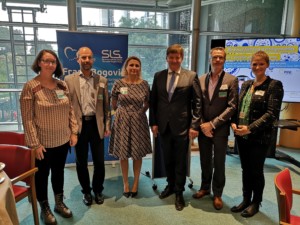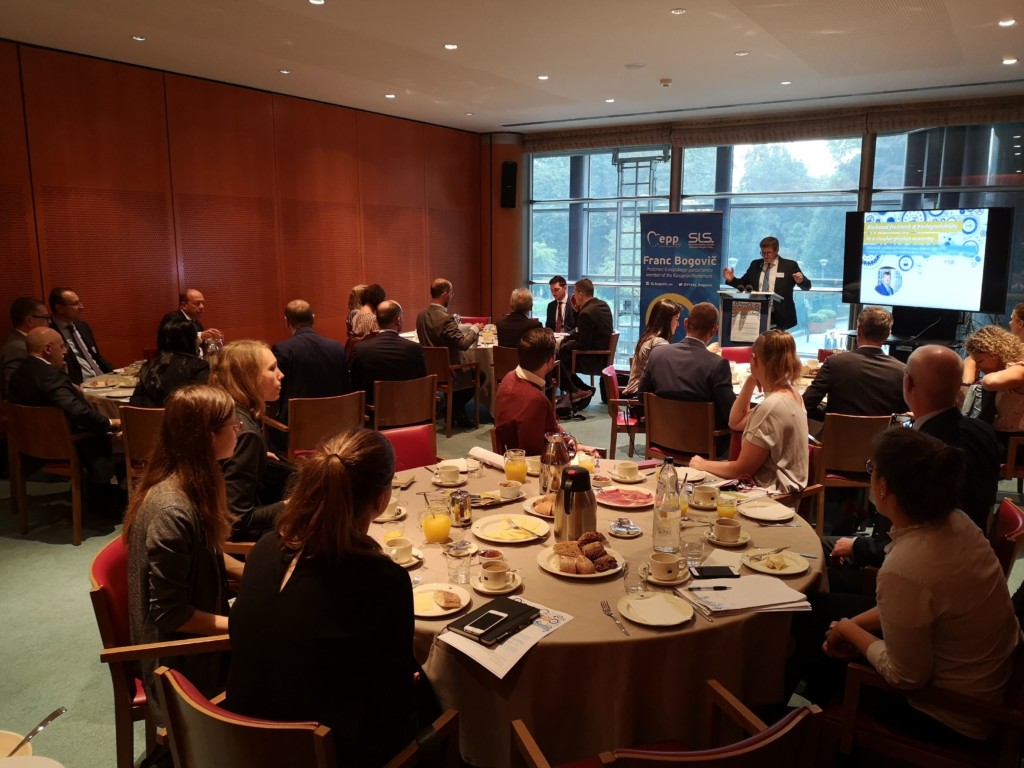
from left to right: Eva Štraser (Evegreen/Bioplasticpot), Stephan Kabasci (Fraunhofer UMSICHT), Mariagiovanna Vetere (EUBP/NatureWorks), Franc Bogovič (MEP) , François de Bie (EUBP/Total Corbion PLA), Kristy-Barbara Lange (EUBP)
On 24 September, European Bioplastics, together with MEP Franc Bogovič (EPP, Slovenia), held a working breakfast in the European Parliament on the role of bio-based feedstock and biodegradability in a circular plastics economy. The importance of the issue was clearly evident, based on the great number of participants and the diverse range of stakeholders, including industry representatives, policy makers and NGOs. Mr Bogovič stressed the urge to adjust the generation of raw materials, our ways of manufacturing, as well as the use and disposal of products. “Circular thinking is key to conserving resources, reducing emissions, and providing safe, healthy and comfortable opportunities,” said Bogovič. By harnessing the potential of bioplastics, the aim is to integrate bioeconomy and circular economy. The focus lies on the use of natural resources that we have in the EU and also on drastically reducing our carbon footprint.
Mariagiovanna Vetere from European Bioplastics outlined current trends in the production and use of bioplastics in various economic sectors. She linked the topic to the concern for reducing long-term emissions, which is also one of the new European Commission’s priorities. Ms Vetere also presented a diverse varieties of raw materials, from most profitable maize to algae and industrial raw materials. By explaining the work of biorefineries ,she focused on the issue of local development.
Dr. Stephan Kabasci of the Fraunhofer UMSICHT Institute spoke about the different end of life options for bio-based durable and biodegradable products. He elaborated on the suitability of different bioplastics as well as of final products and concluded that the use of plastic products needs to change. Circularity needs to be implemented, and bioplastics can be part of the solution.
A best case example for an innovative solution in the field of bioplastics production was presented by Slovenian entrepreneur Eva Štraser from the startup company Evegreen / Bioplasticpot. Ms Štraser gave an overview on Evegreen’s mission, which calls on industrial partners to use bio-based and biodegradable plastic solutions, especially for products that are intended to be left in the environment and remain there. She outlined the specific market situation and possible solutions for particular applications, such as funeral candles and biodegradable flower pots, which convert into fertilizer after use.
“We will never be able to completely replace plastics, therefore it is necessary to develop alternatives that reduce the impact on the environment, e.g. through concepts of reuse, increased durability or innovative solutions that help to reduce mircoplastics,” concluded MEP Bogovič.

MEP Franc Bogovič opens parliamentary breakfast with welcome speech.